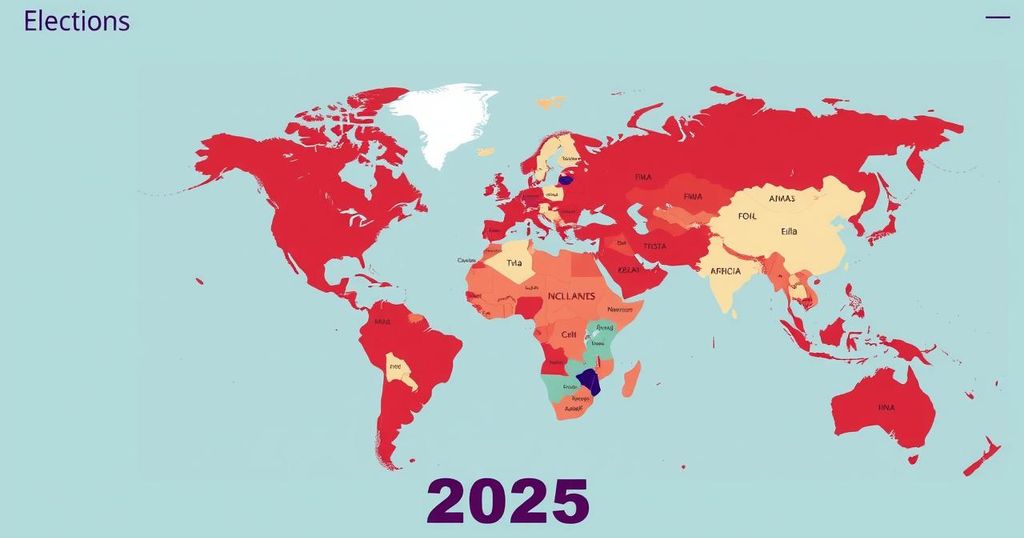Key Global Elections to Watch in 2025: Stakes and Implications

In 2025, significant elections will take place in Belarus, Germany, the Philippines, Canada, and Chile, with experts assessing the stakes involved. Belarus may reinforce authoritarian rule under Lukashenko; Germany faces a pivotal moment for its leadership amid economic challenges; the Philippines’ midterm elections could consolidate power for Marcos Jr.; Canada may confront a shift in political control ahead of federal elections; and Chile’s presidency is poised for potential change after years of instability.
As 2025 approaches, significant elections are on the horizon, despite a less hectic electoral calendar than the previous year. Experts illuminate the stakes for pivotal elections in Belarus, Germany, the Philippines, Canada, and Chile, touching upon vital themes like inflation, the rise of populist movements, and geopolitical tensions. Each election bears its unique considerations, ranging from authoritarianism in Belarus to economic challenges in Germany. These elections could shape political trajectories, with implications that extend beyond national borders.
In Belarus, President Alexander Lukashenko, Europe’s longest-serving dictator, is set to run for a seventh term in an election on January 26, 2025. With no substantial opposition and ongoing repression, the likelihood of free and fair elections appears grim. Lukashenko’s potential victory would reinforce Belarus’s alliance with Russia, particularly in the context of the ongoing conflict in Ukraine.
Germany faces an unexpected federal election on February 23 due to the collapse of Chancellor Olaf Scholz’s coalition government. Economic turmoil and geopolitical tensions frame this election, as the country grapples with persistent recession and competition from China. Scholz’s approval ratings have plummeted, giving the opposition significant momentum, and experts predict a potential swing towards a center-right government.
The Philippines will hold midterm elections on May 12, 2025, where voters will have the opportunity to influence the composition of the Senate. President Ferdinand Marcos Jr. aims for a marionette Senate to solidify his control, particularly as conflict brews with Vice President Sara Duterte. The stakes are high as the outcomes could shape the country’s political future.
In Canada, impending elections may occur before the scheduled date of October 20, 2025, as Prime Minister Justin Trudeau faces growing pressure from Conservative opponent Pierre Poilievre amid dissatisfaction related to economic conditions. The election will serve as a referendum on Trudeau’s political agenda, contrasting contemporary leftism with the rising populist sentiments.
Finally, Chile’s presidential election is scheduled for November 16, 2025. Current President Gabriel Boric’s inability to achieve his reformist agenda has created a political vacuum for the opposition, particularly the right-wing coalition led by Evelyn Matthei. This election could have profound implications for Chile’s constitutional future, considering its recent political upheavals.
In summary, the elections in 2025 will be crucial, reflecting both national and international sentiments. Engage with these electoral events as they unfold, as they promise not only to reshape the political landscape of the respective countries, but also to bear influence on global dynamics.
The landscape for global elections in 2025 will witness several countries facing significant political transitions amidst various influences such as economic hardship and rising populism. Although the year may not see as many elections as 2024, important ballots in Belarus, Germany, the Philippines, Canada, and Chile represent broader themes relevant to contemporary political discourse. These elections highlight the localized and global challenges that voters and politicians face, from authoritarianism and economic recession to intra-political conflicts and governance issues.
The events of 2025 will be pivotal as countries navigate their political futures against a backdrop of economic difficulties, rising populism, and geopolitical strife. The outcomes of elections in Belarus, Germany, the Philippines, Canada, and Chile will not only determine domestic policies but may also influence international relations. Observers should closely monitor these elections as they unfold to gain insights into potential shifts in the global political landscape.
Original Source: www.ndtv.com







